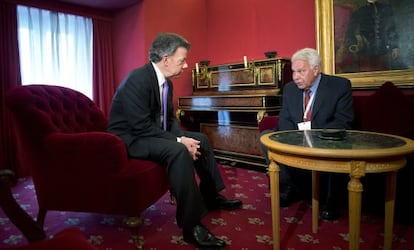Colombia will send top military aides to negotiate definitive FARC ceasefire
President Santos admits “not everyone will be happy” when peace deal is finally reached

The Colombian government will send a top delegation of five generals and one admiral to Havana on Tuesday to negotiate a formal ceasefire with the Revolutionary Armed Forces of Colombia (FARC), sources close to President Juan Manuel Santos confirmed on Monday.
Santos is in Madrid to participate in the Colombia Peace Forum, which is sponsored by EL PAÍS.
“Who better than military personnel themselves to pave the road for a definitive peace deal?” said Santos during the conference.
Santos also pointed out that thanks to his own initiatives, representatives of the victims from Colombia’s more than 50-year-old insurgency have also participated in the peace talks in Cuba, which got underway in November 2013.
“I see the victims as more generous than the majority of the population, which is to say that we are going to find that [difficult] point where a line is drawn between justice and peace,” he said in an interview with EL PAÍS published at the weekend.
I see the victims as more generous in this peace process than the majority of the population”
It is estimated that around 200,000 people have been killed in the guerrilla warfare over the past five decades. Before Christmas the FARC announced a ceasefire, which is still intact.
Santos said he had “never seen the FARC so committed” to finding ways to end the conflict. But when asked if the process was irreversible, Santos replied: “You can never say never.”
“I can’t guarantee that there will be a peace deal but all the signs show that we are going in the right direction. We are heading toward the end of the conflict but the most difficult part remains, and sometimes processes break at the most difficult points.”
The president acknowledged that not everyone would be happy with any final accord. “There are going to be people who want tougher justice and others who will say, ‘Don’t try me for any crimes because I don’t deserve this – I was a rebel; this was my ideology’.”
A big factor that could complicate the peace talks are demands by the United States to extradite FARC members wanted for drug trafficking and other crimes. But Santos said he was ready to seek a deal with Washington over the matter.
I can’t guarantee that there will be a deal but the signs show we are in the right direction”
“No one is going to give up an armed struggle to die in a US prison – that is totally unrealistic. One of my responsibilities with the United States is to look for a solution to this,” said Santos, adding that these discussions and guarantees not to extradite FARC members were already being discussed with the rebels.
“In the long run, justice cannot serve as an obstacle to peace,” he said.
At the same time, the president said there was “nearly an agreement” concerning justice for Colombian military officers who are suspected of committing crimes. “And not only the military. There is an offer so that the so-called non-combatants – businessmen, ranchers, politicians, judges, or anyone who somehow contributed to the conflict, financed the conflict – will also be subjected to transitional justice.”
The formation of a Truth Commission is also under discussion at the Havana talks but Santos said he was cautious about agreeing to amnesty in exchange for confessions, as happened in South Africa.
“There are people who fear peace because peace means change. Sadly, we have grown accustomed to living with war [...] Selling peace is a lot more difficult than selling a war. Selling a war is more popular and easier because you show off trophies and everyone applauds.
There are people who fear peace because peace means change ”
“On the other hand selling peace is much more difficult because it requires making sacrifices, a lot of studying, and you need to reconcile all the hate, wounds and resentment that have accumulated after 50 years,” he said.
When asked if he and his family felt like traitors to his privileged background – the type of privilege the rebels were fighting against – by offering a peace deal to the FARC, Santos said that he was “not bothered” what people thought of him.
“Nothing has been improvised here. I have had this on my mind for a long time. I have been studying processes around the world,” he continued. “I have spoken to international experts, who have given me invaluable advice.
“This is something I have always believed in – not only in peace but creating the conditions so that it lasts.”
Tu suscripción se está usando en otro dispositivo
¿Quieres añadir otro usuario a tu suscripción?
Si continúas leyendo en este dispositivo, no se podrá leer en el otro.
FlechaTu suscripción se está usando en otro dispositivo y solo puedes acceder a EL PAÍS desde un dispositivo a la vez.
Si quieres compartir tu cuenta, cambia tu suscripción a la modalidad Premium, así podrás añadir otro usuario. Cada uno accederá con su propia cuenta de email, lo que os permitirá personalizar vuestra experiencia en EL PAÍS.
¿Tienes una suscripción de empresa? Accede aquí para contratar más cuentas.
En el caso de no saber quién está usando tu cuenta, te recomendamos cambiar tu contraseña aquí.
Si decides continuar compartiendo tu cuenta, este mensaje se mostrará en tu dispositivo y en el de la otra persona que está usando tu cuenta de forma indefinida, afectando a tu experiencia de lectura. Puedes consultar aquí los términos y condiciones de la suscripción digital.








































